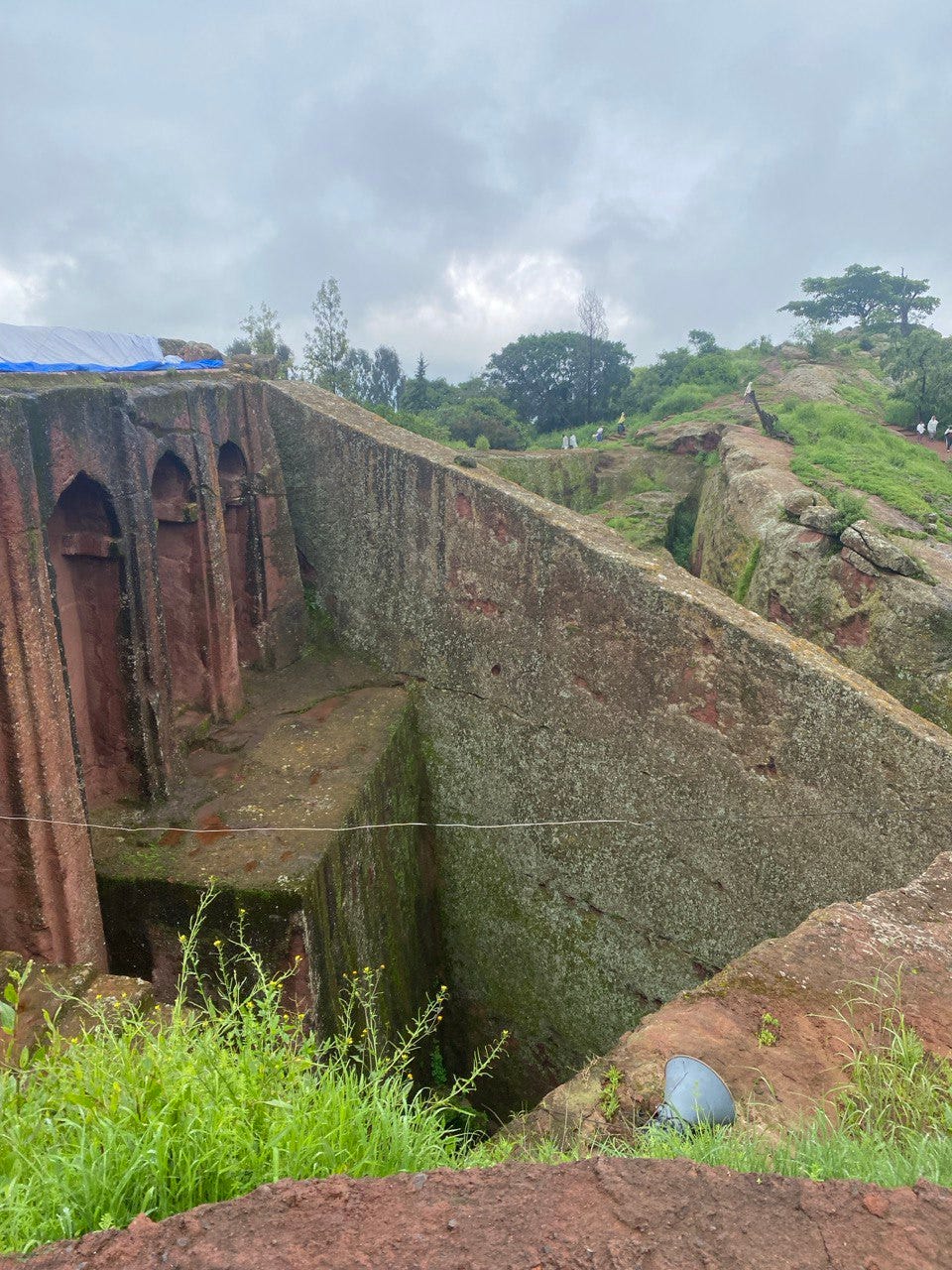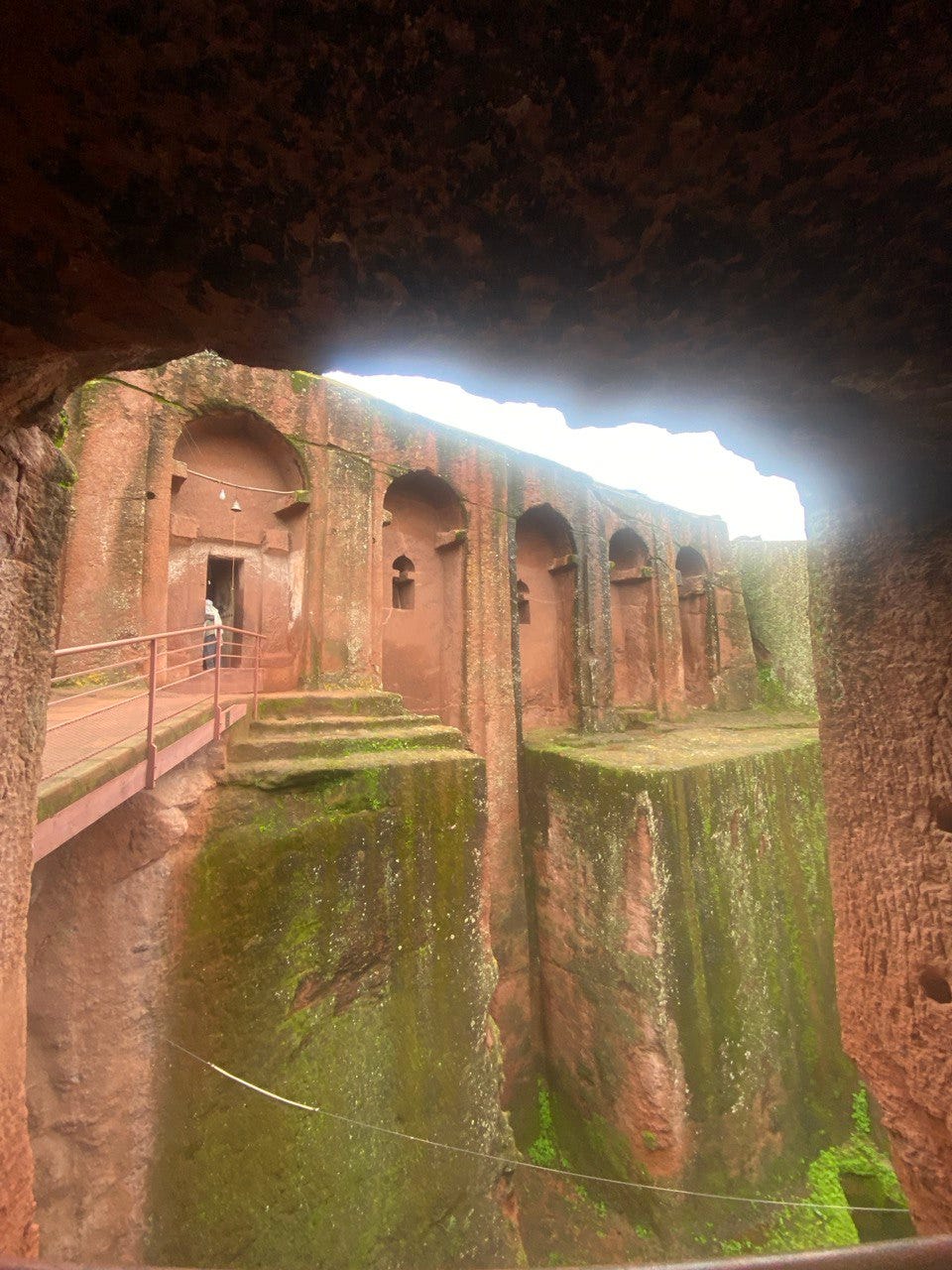"This is the road to Heaven," the guide pointed to a stone strip soaring into the sky beside Biete Gabriel-Rafael, flanked by two deep trenches.
A stairway without steps, ending its path in the sky. A creation of the 12th century — a timeless striving of every human being throughout history toward the same goal.
"So high..." I craned my neck and looked down, careful not to step too close to the edge.
Like the churches of Lalibela, the Road to Heaven is carved into the rock. Once it was just a mountain, and now vast churches stand there — not rising above the earth, but protected by a hidden strength bestowed by nature.
Some of the churches are hewn from a monolithic block, carved deep within and hidden inside; others are semi-monolithic.
Simple and exalted. No pomp, no perfect tourist signs or gaudy images — only stone, peculiar icons, and a musty smell. And each church has its own.
"When we were boys, we used to run along the Road to Heaven," the guide smiled faintly. "My friend died here."
I cast another glance at the narrow stone road without railings — slippery, smooth, and now chilling to the soul.
"Over there he slipped and fell." The guide pointed to the trench below, where water and tall grass stood. "Death was quick. A crack — and that was it. He broke his head. It was a drought, and there was no water. If there had been — he wouldn’t have been killed. He would have swum out."
In my mind, instead of blossoming water below, there appeared a picture of a dry ravine, with bare stones and a thin boy lying upon them, dressed in torn, dirty clothes — never reaching Heaven.
Now in Lalibela it is the rainy season, but in a couple of months everything will be bare and dry, just as I imagine it now.
"Come," the guide waved his hand, eager to show us the double church of Gabriel and Raphael.
As we walked along the slippery stones, carved centuries ago by King Lalibela and, as legend says, by angels, the guide spoke with fervor about the city, the churches, and the king himself. I kept my eyes fixed on the slick ground, yet in every word I felt the faith and fire in his eyes as he spoke of the sanctity of this place. And the more he spoke, the more the stone walls came alive in my imagination, becoming sacred to me as well.
My grandmother believed like that: she prayed from morning to night and believed unconditionally and devoutly. But she believed in the Bible and the church, while the people of Lalibela believe in something greater: they believe in uncreated miracles, that Ethiopia is the Promised Land, and Lalibela the African Jerusalem.
And I believe them.
After all, they are right when they say beauty is in the eye of the beholder. I looked at the weathered walls, some volcanic, some clay, and I saw in them what the locals see — and what, it seemed, the few tourists we met on the way could not.
"Originally, there was no passage to Biete Gabriel-Rafael," the guide pointed to the trench between us and the churches. "This bridge was built in modern times to replace wooden poles."
"But doesn’t the Road to Heaven lead to the churches?"
"It was made that way on purpose, so no one could get there," the guide misheard my question. "Many treasures were later found in those churches."
"Hmm..."
Had I been that boy, I too would have wanted to soar up this road to Heaven. Perhaps not quite to Heaven itself, but to the churches — full of treasures and mysteries.
I looked again at the stone strip leading to the rooftops of the churches. It turned out, the Road to Heaven is not for everyone. And certainly not for treasure hunters.
As we walked along the slippery path of a narrow man-made gorge to the next church, I kept thinking about that boy, yearning for Heaven.
Perhaps he was taken to Heaven, just as he wished. Perhaps God needed him as a lesson for the others. Or perhaps he was one of those destined never to reach Heaven — for desiring treasure, or for something else he had done, known only to him and God.
"Do people still run along the Road to Heaven?" I asked, keeping my eyes on the slippery stones beneath my feet.
"No, it’s far too dangerous."



